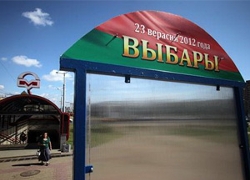Politologists: Opposition candidates were allowed to frolic a little
7- 24.08.2012, 11:45

Most aspirants nominated by opposition parties were registered as parliamentary candidates.
The United Civil Party (UCP) proposed 48 candidates, but only 35 were registered. BPF party nominated 33 party members, of which 30 people received candidate's certificates. Registration was passed by 11 of 15 people nominated by the Belarusian Social Democratic Party (Hramada). Registration was also successful for UCP leader Anatol Lyabedzka, BPF head Alyaksei Yanukevich and former presidential candidate Ryhor Kastusyou. Experts of Zavtra Tvoei Strany project analyze if it means liberalization of the election campaign.
Political observer of Belorusy i Rynok weekly newspaper, Paulyuk Bykouski, emphasizes that most of registered opposition candidates were nominated by parties, but not through signature collection of voters. This way of nomination turned to be the most reliable and most nominees of parties passed registration,” the expert notes. “The people who were not registered had things to find faults with, such as errors in income tax returns and assets declarations. For example, someone forgot to deregister a car he hasn't used for a long time. The CEC may have regarded it as a serious mistake.”
According to Paulyuk Bykouski, it would be interesting to see how appeals of unregistered candidates against declaring their signatures invalid will be considered.
“Usually, some people can be registered after appeals. We see that most of registered opposition candidates are nominated by parties. Nearly all of them said they would withdraw from the elections. Only candidates of the Belarusian Left Party 'Fair World' plan to run in the race until the end. Participation of candidates from the Belarusian Social Democratic Party (Hramada) is under question. The party did not make a final decision regarding withdrawing and recommended its candidates to decide it themselves taking into account the atmosphere in their constituencies. So, voters will not have a wide choice – to vote for the opposition or not,” the political observer thinks.
The analysts stresses elections in a number of constituencies, where opposition representatives will withdraw, will be non-competitive de jure.
“Most of other constituencies will have sparring partners of pro-governmental candidates needed only to have competitive elections. When the election is non-competitive, there is an opportunity to vote against the candidate thus organizing protest voting,” the expert thinks.
Politologist Alyaksandr Klaskouski also says nomination by parties in some degree helped opposition members to pass registration. The analyst thinks it is not a sign of liberalization of the election campaign.
“Nomination and registration are not dangerous for the authorities. Everything remains under control. The main thing is the result of the voting. The authorities can allow candidates to frolic on these stages: let observers see this pluralism,” the analyst notes. “Small innovations do not change the situation fundamentally and do not solve the main problem: transparency on the final stage. It is just a play. They can extend boundaries a little and create an appearance of competition on the insignificant stage.”









